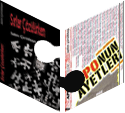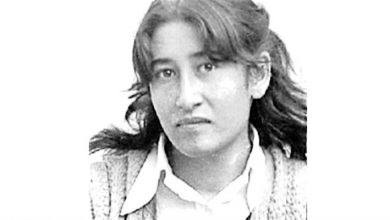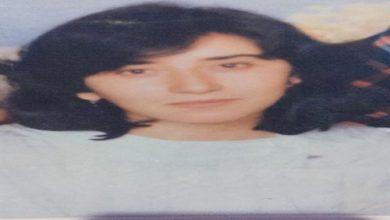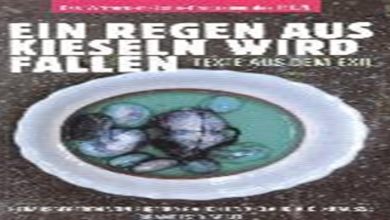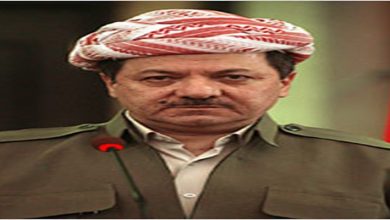
Dr. Said – We lost the key to the mountains
The biographical novel written by Selim Çürükkaya which was published in Kurdish and Turkish by DOZ Publications in Istanbul in October 2020, is 727 pages long. The book tells the story of Dr. Said Çürükkaya’s family going back three generations. Printed on a dark blue background, a thoughtful image of Dr. Said is seen on the cover of the book, underneath the photo is his name in bright red handwriting and the under title “We lost the key to the mountains” making the reader reflect. Upon opening the book, you will initially see the summary of the book and the first paragraph is as follows:
“This work is a century-old epic of an oppressed nation, kneaded with pain. Dr. Said, who left his life in Germany after ISIS attacked Kurdistan, decided to return to the armed struggle, for justified reasons, which he had abandoned, again for justified reasons, fourteen years ago.”
A few quotations about Dr. Said by the President of the Kurdistan Federation, Mr. Masud Barzani, French Philosopher Mr. Bernard-Henri Lévy, Mr. Dr. İsmail Beşikçi can be found on the back of the book. The book starts with the words by American writer Aliza Marcus: “Said was like the wind; never lingering, he would move on; he cannot be described in words…” The biographical novel begins with an introduction that the book was translated into English, Kurdish and French and published in both Kurdish and Turkish.
The first chapter describes how the explosion of a bomb laid by ISIS in Bashika, close to Mosul, injured Dr. Said and killed his assistant Mohammed Rasul. It also provides an insight into Dr. Said’s journey to a hospital in Erbil, and then to Germany by an ambulance plane. Dr. Said, who lost his life in Koblenz Military Hospital, was welcomed with a military ceremony in Erbil and with a funeral ceremony in Germany attended by thousands of people, and later he was buried in the village where he was born.
The second chapter begins with the dramatic life story of Dr. Said’s maternal grandfather Isa. In 1917, Russian soldiers reached a region close to the city of Bingöl. The Ottoman army had enacted a law of mobilization. Seeing his dog bark and run toward the village, Isa climbs up a hill and sees the Ottoman soldiers carrying a rope around his brothers’ necks. When it gets dark, he returns to the village, takes his two crying sisters, their belongings, animals and leaves the village. He settles in another mountain village where another one of his sisters was living. His four brothers, who were forced to go to war, never return. Later he hears that two of them died of typhoid fever, and the other two froze to death.
The third part of the book details the life of Dr. Said’s grandmother, Helma. Helma, who was forced into marriage as the fourth wife of an imam, persuades the third wife of the imam to escape together to the city of Diyarbakır. After divorcing the imam, Dr. Said’s grandmother marries Isa. They settle in a village called Tuunst, which was situated along the valley of Murat River, directly across Akdağ and between the towns of Palu and Genç. This was a mountain village, so the people living in the village had been subdued and scared by jinns, fairies, giants, demons, angels and the Turkish gendarmerie.
The sixth chapter of the book is about the murder of Doctor Said’s great-grandfather, Şemdin Ağa, who was killed by his enemies with a rifle as he was sleeping in the shade of a willow tree. Realizing that its beloved owner was dead, his white horse gallops to Tuunst, bringing the villagers to the place where the body was found. This chapter continues with the story of Dr. Said’s parents, Süleyman and Zeynep.
In the following chapters, the very interesting love story of Said’s parents is told. Süleyman being forced to work for a railway project, the stories of the people who went to “bin xet” during the Sheikh Said rebellion, the death of Isa and his sister Wıç, Süleyman and Teyba’s marriage, Süleyman’s experiences in the army are narrated in a breath-taking way. Changes in the environment take place with the railway passing near the village, the first school opening in Tuunst village and Abdulhamid Efendi’s wooden boat. As soon as the gas lamp comes to the village, jinns and giants disappear. In one chapter, the flute player of the village dies in a blizzard, leaving his wife Derd all alone.
The next chapters talk about the children of Süleyman and Teyba and their migration from Tuunst to Çılkani village. Following this, the story of their elder son Selim begins. His story is political. While working in a billiard saloon in Ceyhan, he started reading newspapers and books, where he first discovered the struggle that Kurdistan faced in the 1970s. He became a Kurdistan revolutionist in 1975 while he was studying at Tunceli Teachers’ Academy. He was caught and put in Diyarbakır prison during the military junta of September 12.
Dr. Said was only twelve years old when that happened. He started participating in active politics in 1987 when he was studying at the medical faculty of Çukurova. He discusses matters with his teacher, poet Adnan Yücel. He gives the books written by his brother to him. Adnan Yücel, who read these books, writes the story “Children of fire and the sun”. Following the tortures his friends and relatives who were arrested suffered, Said goes to the countryside of Diyarbakır. He returns to Adana with a launcher and a projectile he obtained from a guerrilla commander and launches the rocket into the police station and leaves the city immediately. Then, he became a guerrilla commander in the mountains of Kurdistan. His first place of duty was Akdağ region, where his grandfather Isa was born and raised. His grandfather had left that place out of desperation. But seventy years later his grandson, Dr. Said, decided to establish an army in the same region, in the same mountains. As soon as he gathered the guerrilla troops, he got rid of each and every security station that kept the region in captivity. He blew up the railway where his father worked as a slave, as well as not allowing a train carrying military logistics to pass.
Along the chapters, Dr. Said listens to several stories from the elders who had witnessed the Sheikh Said rebellion. He uses the stories as justification for his actions. The book elaborates on Dr. Said’s ten years of guerrilla life. His life on the mountain has two parts. Romance is dominant in the first part. He was still very naïve as he had no idea what was happening within the organization due to his focus being locked in on the struggle and the war. He hadn’t yet read “Apo’s Verses” by his brother Selim, who wrote about the true face of the PKK and its leader Öcalan after his release from prison in 1991. The second part of his guerrilla life is the part where he wakes up, sees the truth and suffers. What he saw and what he experienced leads him to a rebellion within the organization as if “taking to the mountain while still on the mountain”. He leaves the PKK at the beginning of 2000 and comes to Germany. He learns the language in Bremen, enrols at the university, finishes his studies in social pedagogy, and sets up three workplaces. Just when his life finds peace and order, ISIS attacks Kurdistan.
He goes to Duhok thinking “My country is under attack, my people are facing massacre and I cannot stay in Germany under these circumstances”. He establishes a military headquarter in the Naveran region, where he trains volunteers as Peshmerga (Kurdish police force). He specializes in mine clearing, dismantling bombs, locating ISIS war tunnels and in training personnel. He blows like a storm in all fronts of the war. He engages with the generals of the coalition forces, training coalition officers on ISIS mines, ISIS tunnels, and irregular warfare.
The book not only talks about political events, but also describes geography, mountains, valleys, winters, summers, singing streams, birds preparing for migration, and the winds that determine the fate of leaves. It displays the stories of the past and the day before your eyes like a gallery.
Unfortunately, this book was confiscated and forbidden in Turkey on the 04.01.2021 with the decision of the Istanbul Criminal Court of Peace. The document and its translation can be found below (1)
DOZ Publication Director, Köroğlu Karaaslan
hk.karaaslan@yahoo.com
- REFERENCE NUMBER: 2021/73 D. İŞ
JUDGE: Özgür Dursun 171455
CLERK: Hakan Balı 142145
With a letter, dated 04.01 2021 and investigation number 2021/462, The Press Office of the Istanbul Prosecutor (Istanbul savciliğı basın bürosu) requested seizure along of a ban of printing, distribution and sales. Accordingly, it has been investigated.
CONSIDERED AS REQUIRED
After analysing the official report, dated 04.01. 21, together with the whole content of the dossier; the followings are found from the pages 25,29,219,223,225,238,242,245,252-255,267,288 289,293,297,303,308, 330,340,396-402,405,408-416 ,414, 440, 444, 447, 446 of the book with the title DR. SAİD DAĞLARIN KİLİDİNİ KAYBETTİK (DR. SAİD WE HAVE LOST THE LOCK OF THE MOUNTAINS): There are expressions aiming to get supporters for the PKK / KCK armed terrorist organization. it is also serving to strengthen the beliefs of those supporters. In the book the violent methods of the PKK / KCK armed terrorist organization are praised and it is found that there is a deliberate aim of inculcating or encouraging this issue in which propaganda of the terrorist organization is made by writing. Furthermore, from both the official report in the dossier and from the book it is concluded that people fighting against terrorism are showed as target.
With the ACCEPTANCE OF REQUEST OF the Public Prosecutor;
” DR. SAİD WE HAVE LOOST LOCK OF THE MOUNTAINS”, written by M. Selim ÇÜRÜKKAYA and published by the DOZ Publishing House, the articles of 3713 numbered 7 / 2.6 / 1 and the Press Law numbered 5187, Article 25/2 of the Law on PRINTING, a ban of DISTRIBUTION and SALES, SEIZURE (COLLECTION) of the books obtained.
The document will be returned to the Istanbul Public Prosecutor,
Provided that the related person can make a written or verbal objection to the Istanbul 3rd Criminal Court of Peace (3. Sulh ceza hakimliğ) within 7 days after notification of this verdict, this decision has been taken at the end of the examination of documents on the 04.01.2021.
Secretary 142 145 Judge 171455
E signature E signature
